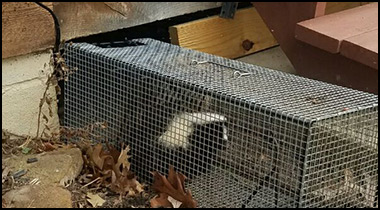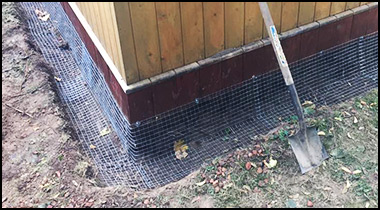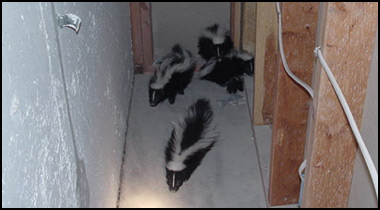Lawrenceville Skunk Removal Resources
Skunk Rehabber - Georgia Pest and Wildlife Specialists: (678) 313-3781
Free Gwinnett County Animal Services: (770) 339-3200
Humane Wildlife Trappers of Lawrenceville: 678-804-4556
If you need skunk control in Lawrenceville, you have a few options. First, you can attempt to solve the skunk problem yourself by reading our do-it-yourself guide. If you need outside help, you can also call Gwinnett County Animal Services to see if they have any free resources or help for you - however, they primarily deal with dog and cat concerns. You can also call a local Lawrenceville wildlife rehabber, as they are typically a great resource for advice that is in the best welfare of the animal. If as a last resort you must hire a professional company, we recommend Humane Wildlife Trappers of Lawrenceville at 678-804-4556. To learn more about them or check their skunk removal prices, visit lawrencevillepestanimal.com.

Lawrenceville Skunk Trapping and Removal

Preventative Repairs & Exclusion

Lawrenceville Skunk Removal From Structures
In many cases, preventative measures can solve your Lawrenceville skunk problem - keep garbage secured, pet food indoors, and most of all when it comes to skunks, secure the perimeter of your shed, porch, deck, or house with a barrier - lattice or steel mesh is good, and it keeps Georgia skunks from going under the structure. If trapping and removal of the skunk is the only option you have, please do so with the help of a local agency or professional company who knows how to do it humanely and legally. Browse the resources of this site for more educational information.
Frequently Asked Questions:
Prevention: How to Keep Skunks Away
What to do with a skunk after I catch it?
Is it legal for me to trap a skunk?
How to remove skunk odor
Is a skunk active during the daytime rabid?
What does skunk feces look like?
Lawrenceville Skunk Control Information: Do skunks shed their fur?
Skunks may experience the seasonal loss of their hair all over the body and the hair will be thinning. There are other skunks that will lose the air in the tails. However, the shedding will also depend on the areas where the skunk lives. Shedding of the hair of a skunk should not be of a concern if it is in its first year but the hair should start to grow back in few weeks. Poor diet may also contribute to the shedding of the hair. It the skin looks broken during the shedding, then a skunk pet should be taken to a see a vet. If the skunk eats a good diet of vegetables, fats and protein and it looks healthy, it should be given zinc on a low dosage so that the fur can grow back faster. However, since this is a seasonal shedding, there is no need to do anything.
The shedding is important and natural process to the animals and the process will allow the animals to mature and to grow in a healthier manner. However, there are sometime when the shedding may not be good. It is important to be aware of healthy and unhealthy shedding. The skunk will shade on annual or on biannual basis while the young will shed often compared to the adults.
The mammals shed the fur for many reasons. The common reason for the mammals is discarding the damaged and old hair strands in order to make a place to the new fur. According to the types and health of the skunks, the skunk may lose just a small amount of the hair or sometime large amount. Other reasons why a skunk can lose hair are health, malnutrition and stress issues. Presence of the fleas and lice will produce bald patched in the fur coat of the mammals.
In spring time, the skunk can shed the winter coat so that a shorter and lightweight hair can take a place of the heavier winter coat. As the months of autumn ends, the skunk can then shed lighter coat to grow a thicker and denser hair in order to grow a better hair that will protect the body against cold winter condition.
When the skunk shed too much, this may be the sign of the health condition. There is excessive shedding which is associated with the medical condition like fungal infection, protein deficiencies, metabolic disease, allergic dermatitis and inhalant allergies or food allergies
Remember, for free services you can try (678) 313-3781 or (770) 339-3200, but if you need to pay for professional help, check the prices at the lawrencevillepestanimal.com website. Or follow our do-it-yourself guide!

